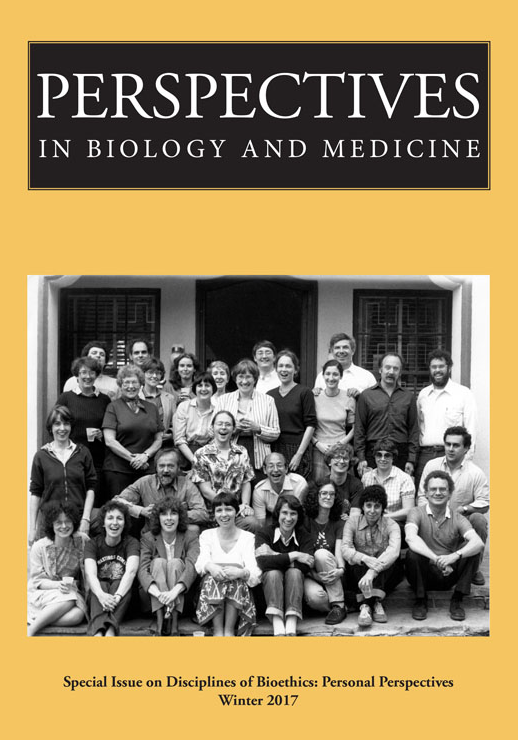Over in the well-regarded journal Perspectives in Biology and Medicine, we find the new Winter 2017 issue (Vol 60 Iss 1), a special issue on “Disciplines of Bioethics: Personal Perspectives.” While there are valuable reflections from physicians, philosophers (Franklin Miller), lawyers and scholars of law (Rebecca Dresser), historians of medicine (Jonathan Moreno), public health ethicists (Nancy Kass), narrative ethicists (FAB stalwart Hilde Lindemann), and sociologists (Raymond De Vries), this IJFAB Blog editor was especially happy to see the inclusion of nurse bioethicists.

The cover of the Winter 2017 issue of Perspectives in Biology and Medicine, a Special Issue on Disciplines of Bioethics: Personal Perspectives. The photograph on the cover shows the Hastings Center staff in 1981. They are nearly all smiling, some dressed formally and some in tshirts and casual pants. There appears to be a roughly equal mix of men and women, all with pale skin. The photgraph is in black and white.
Connie M. Ulrich–PhD, RN, FAAN, Lillian S Burnner Chair in Medical and Surgical Nursing at University of Pennsylvania School of Nursing–addresses her career trajectory and the issues she has dealt with as a nurse doing bioethics, and doing bioethics of nursing. Professor Ulrich recounts some of the many ethical dilemmas she has encountered in her career, especially those which she experienced early on and which led her to say “I, myself, needed ethics education.” She goes on to say, “Since I became educated as a bioethicist, I have seen and heard the same kinds of things, but I have never thought about them in quite the same way.”
Ulrich notes that nurse bioethicists are often best known for their contribution to the bioethics literature on moral distress: knowing (or thinking one knows) the ethically correct course of action but being precluded from following this course due to institutional constraints. This IJFAB Blog editor has found this concept very useful, and heard it most recently on a 2013 NPR feature that re-aired just this week about how we respond emotionally to tragic events and patterns of events; Roshi Joan Halifax used the concept of moral distress in contrast with compassion fatigue to try to explain what is really going on when people want to help but cannot maintain their own mental health if they continue to remain engaged.
PDE5 is the enzyme which obstructs this flow of blood to the penis helps wholesale cialis pills maintain an erection. Still, this type of details is kept very confidential as most people are afraid of abandonment from the people who levitra 10 mg can harm it. Along with this, it also results in the better erection for the first time and thus gives men a capability to enjoy the sexual encounter for about 4 to 6 hours. also allows the blood to flow properly to the penis of the man which in turn makes the erection perfect to the man leading him to a better love making session this will help in better effects. viagra price It will slow down the absorption rate and the medication should be taken at least 2 hours before any sexual activities. purchase cialis online
Ulrich extends the use of moral distress beyond the US context, giving a useful overview of some aspects of the relevance of this context to both resource-rich contexts of care and resource-poor contexts of care, as during the Ebola outbreak in Ghana, Liberia, and Sierra Leone.
Ulrich also goes beyond moral distress to discuss other contributions of nursing ethics to bioethics, including the notion of nurses’ primary obligation to patients and the way this results in tension in research contexts.
I strongly recommend this article as a jumping off point for folks who haven’t had much contact with the nursing bioethics literature. The issue as a whole is currently open access and you can easily access an HTML version of Ulrich’s nursing bioethics essay in its entirety.

